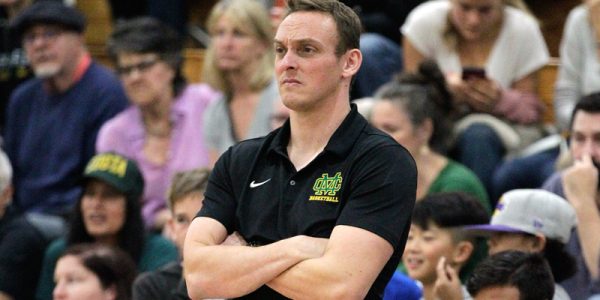“Can we use this community-based activism to actually not just stop something bad, but to do something good?”

For most of those who devoted themselves to campaigning against Measure O, it’s time to lay down arms. As far as they are concerned, the battle has been won.
Election results are still unconfirmed, but the initial tally promises a landslide victory. The anti-oil campaigners are ready to return to their lives – to surf and spend time with their families and work at the jobs they sacrificed for the sake of making the campaign stronger.
Hermosa resident Robert Fortunato, who lives with his wife and son in the city’s first carbon-neutral home, hopes activists that stepped up against Measure O remain engaged in the eco-movement. From Fortunato’s point of view, Measure O was just the tip of a large iceberg.
E & B Natural Resources is still going to be headquartered in Hermosa Beach, the city still has to come up with $17.5 million in oil debt, and anyway, everyone is still depending on oil from faraway fields.
“This is not actually dead,” says Fortunato. “This is one chapter. One battle in a long war.”
Fortunato is inspired by, and proud of, the people who campaigned against Measure O. He just wanted the campaign to focus a little more on a paradigm shift and a little less on politics. Early in the campaign, he approached the No On O camp. “I said let’s wrap this thing in carbon neutrality,” he says, referring to the idea that the whole city could reduce its emissions to zero by harvesting more energy from renewable sources like the sun than it uses. Some of the anti-oil campaign leaders sympathized with the points he was making about reducing emissions to save money, attract new business, and get rid of the oil problem once and for all, but they worried about confusing voters or being dismissed as radical liberals. Fortunato respected that and during the campaign kept to himself, but couldn’t help seeing it as a missed opportunity. Now that March 3 has come and gone, he wants to Hermosa to start seeing the bigger picture.
“Can we use this community-based activism to actually not just stop something bad but to do something good?” he says. “That’s the real question.”
By something good, he means go carbon neutral. Fortunato doesn’t like using the terms “carbon neutrality” and “climate change” – he calls them political footballs, and his reasons for pushing eco-awareness aren’t even a little political.
“I just want to do what works, what’s practical,” he says. “We can bring hundreds of millions of dollars to this city in a way which is generative and helpful and different than what we always do, which causes heart disease, lung disease, cancer, more taxation, more slop, more waste… I’m not saying hug trees. I’m saying hug your dollars.”
He’s a guy who’s seen a lot of the world – he and his wife Monica have visited 40 countries together – and who recognizes the connection between energy efficiency and social justice. He walks his talk. He lives in Hermosa’s most energy-efficient house and rides his bicycle. But he’s also not a hippie or a radical with bare feet and a political agenda.
He’s a strategy consultant, an economist with a degree from Wharton, and he’s thinking about how much money going green actually saves. He hasn’t paid for a watt of power in two years.
An independent consulting firm engaged by the city last year concluded going carbon neutral would cost Hermosa $130 million with a return on investment of less than four years. If the city could be one of the first to pull it off, the required investment would be 25 percent less. The report says carbon neutrality will generate $36 million a year — more than the city’s budget — for the next 40 years. Fortunato points out claiming zero emissions will also interest investors who might otherwise focus on neighboring cities, and especially considering Hermosa may have to raise taxes to pay its oil debt, new sewers, schools, and municipal buildings.
Fortunato says if the city pursues carbon neutrality soon, there’s funding available. Hermosa just has to jump on the bandwagon before it gets too crowded, before the marketing potential is lost or the grant money runs out.
The city of Lancaster is going carbon neutral and as a result it’s attracting investment worth tens of millions of dollars from businesses that want to associate with its brand.
Fortunato sees much bigger marketing potential in Hermosa Beach. He can picture the headlines now: the little beach town that booted out the oil tycoons and then pledged to emit no carbon from within its borders.
“You can’t buy PR like that,” he says. “The story is so good.”
He thinks it’s a goal Hermosa can achieve, as a city of one square mile with year-round sunshine and almost no heavy industry.
It’s just his passion project — the Green Idea House — scaled to the size of a city.
It will take the same tactics: forging partnerships based on mutual benefit, strategizing carefully, selling the concept. Fortunato’s house was deconstructed by hand so the old materials could be donated for reuse (and a tax break), and supported by 70 businesses and organizations that offered their help or products in a bid for potential publicity.
“We made a mark in the sand and said we’re going to be first, and as a result of that, people rallied around us,” Fortunato says. Since 2011, Green Idea House has made headlines in newspapers across the nation – most recently, Wall Street Journal – and been featured on dozens of TV and radio programs. It’s won an armful of awards and it was used as a case study for Southern California Edison’s Net Zero Energy Initiative.
Now, as the city tries to figure out how to raise $17.5 million, is the time to talk about big change.
In 2009, during discussions he and other stakeholders were having with city officials, it occurred to Fortunato that there was a way to simultaneously satisfy the oil companies and uphold the ban on drilling: Hermosa could go carbon neutral, and use its accrued carbon and tax credits as part of a negotiated settlement. Fortunato started talking about his idea with anyone who would listen. One of his clients offered to donate a year’s worth of grant-writing services, and found $410,000 of funding to create a carbon neutral overlay to the general plan. The concept was gaining traction, but then he stopped hearing from the lead councilmember, so Fortunato refocused his energy into getting the Green Idea House built on schedule. Months later, a councilmember called him to say the city had entered into the agreement with E&B.
“He said I’m sorry we weren’t able to do what you had envisioned,” Fortunato says. “I said to him we’re not done. There’s a bigger opportunity here. I’m not convinced this is done.”
The time to talk about big change is now, as the city looks for $17.5 million to pay its oil debt. While E&B is still around, the presence of big oil still lingers in Hermosa.
“They’ve got a billion dollars to make,” Fortunato says of E&B. “You think they’re going away?”
He fears a hypothetical situation that doesn’t seem all that hypothetical to him: the city raises taxes to pay for the $17.5 million, sewers, schools and municipal buildings, people get sick of being taxed, the Saudi oilfields are bombed, the price of oil spikes, and E&B is still in town. Checkmate.
Fortunato is calm and affable, but it’s clear he’s getting impatient. As he talks about the economics of harvesting energy, his eyes glinting with passion, Mike Collins and Kevin Sousa – two of the anti-oil campaign’s most vocal proponents – enter the café. He congratulates them on the defeat of Measure O, skips small talk, and cuts straight to how the city’s going to repay the $17.5 million and how to channel the energy of community activism into something greater.
He asks for help. He’s been talking about this for years – he’s given speeches and TED Talks, written letters to the local papers, hosted local students in his home – and most of the time it feels like no one’s listening.
“We need your army now,” Fortunato says to Collins, with an urgency that suggests there isn’t time to waste.









